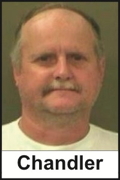Rascals case in brief
In the beginning, in 1989, more than 90 children at the Little Rascals Day Care Center in Edenton, North Carolina, accused a total of 20 adults with 429 instances of sexual abuse over a three-year period. It may have all begun with one parent’s complaint about punishment given her child.
Among the alleged perpetrators: the sheriff and mayor. But prosecutors would charge only Robin Byrum, Darlene Harris, Elizabeth “Betsy” Kelly, Robert “Bob” Kelly, Willard Scott Privott, Shelley Stone and Dawn Wilson – the Edenton 7.
Along with sodomy and beatings, allegations included a baby killed with a handgun, a child being hung upside down from a tree and being set on fire and countless other fantastic incidents involving spaceships, hot air balloons, pirate ships and trained sharks.
By the time prosecutors dropped the last charges in 1997, Little Rascals had become North Carolina’s longest and most costly criminal trial. Prosecutors kept defendants jailed in hopes at least one would turn against their supposed co-conspirators. Remarkably, none did. Another shameful record: Five defendants had to wait longer to face their accusers in court than anyone else in North Carolina history.
Between 1991 and 1997, Ofra Bikel produced three extraordinary episodes on the Little Rascals case for the PBS series “Frontline.” Although “Innocence Lost” did not deter prosecutors, it exposed their tactics and fostered nationwide skepticism and dismay.
With each passing year, the absurdity of the Little Rascals charges has become more obvious. But no admission of error has ever come from prosecutors, police, interviewers or parents. This site is devoted to the issues raised by this case.
On Facebook
Click for earlier Facebook posts archived on this site
Click to go to
Today’s random selection from the Little Rascals Day Care archives….
Click for earlier Facebook posts archived on this site
Click to go to
Today’s random selection from the Little Rascals Day Care archives….
Claims were extraordinary, but evidence wasn’t
July 22, 2013
“Precisely because of human fallibility, extraordinary claims require extraordinary evidence. Now, I know that (alien-abduction theorist) Budd Hopkins responds that extraordinary claims require extraordinary investigations. And I have two kinds of responses to that.
“There is a claim that a brontosaurus is tramping through the jungles today in the Republic of Congo. Should a massive expedition be mounted with government funds to find it, or it is so implausible as not to be worth serious sustained systematic attention?
“My second point is that to the extent that extraordinary claims require extraordinary investigations, those investigations must be true to the spirit of science. And that means highly skeptical, demanding, rigorous standards of evidence. There’s not a hint of that from alien abduction enthusiasts.”
– From “Carl Sagan on Alien Abduction” on NOVA (Feb. 27, 1996)
I’m just trying to imagine the Little Rascals prosecutors and therapists conferring after a long day of bullying 3-year-olds and asking themselves whether their investigations had been “true to the spirit of science.”
‘We’ve learned a lot….’ (Too bad it took so long)
March 30, 2012
Kee MacFarlane is the notorious therapist who led the ritual abuse scare of the late 1980s (and pioneered the misuse of anatomically correct dolls in interviewing children). In just four months MacFarlane diagnosed more than 360 children at the McMartin Pre-School as abused.
In 2005 she declined to be interviewed by CNN but sent a statement:
“We’ve learned a lot in 20 years about how to interview children for forensic purposes and how to manage complex cases such as this one. It would be a sad commentary if we didn’t learn from such painful experience.”
Not much of a mea culpa – but still more than anyone connected with the Little Rascals prosecution has managed.
Sex-abuse journalism raises ‘strange question’
 Nov. 9, 2012
Nov. 9, 2012
“Did I recognize that child sex abuse existed and was a serious problem? reporters would ask. A strange question, that. The discussion of no other crime would require such a disclaimer. Journalists who have written about false murder charges are seldom asked to provide reassurance that they know murder is a bad thing, and it really happens.”
– From “No Crueler Tyrannies: Accusations, False Witness and Other Terrors of Our Times” by Dorothy Rabinowitz (2003)
Clemency for Junior Chandler is long overdue
 Sept. 2, 2013
Sept. 2, 2013
“That power (of clemency), which the Constitution explicitly grants to the president, has always served as an indispensable check on the injustices of the legal system and as a means of demonstrating forgiveness where it is called for. It was once used freely; presidents issued more than 10,000 grants of clemency between 1885 and 1930 alone. But mercy is a four-letter word in an era when politicians have competed to see who can be toughest on crime….
“Meanwhile, President Obama’s use of the pardon power remains historically low. In four and a half years, he has received almost 10,000 applications for clemency and has granted just 39 pardons and one sentence commutation. No one seems to know why some requests are granted and others denied….”
– From “Pardon Rates Remain Low,” editorial in the New York Times (Aug. 21, 2013
Pardons have become scarce in North Carolina as well. In her last week as governor, Bev Perdue pardoned the Wilmington 10, but not the Edenton Seven – or anyone else, for that matter.
Perdue left office without commenting on the dozens of clemency applications still on her desk. (Her willingness to forgive contrasts with that of previous governors, most dramatically Charles Brantley Aycock, who between 1901 and 1905 granted no fewer than 369 pardons.)
Among those applications Perdue didn’t address was Junior Chandler’s.
Now there’s a new governor, and Junior’s brother Billy tells me a renewed effort is being made to obtain clemency. Even if Junior were guilty – which he obviously isn’t – shouldn’t 26 years behind bars be punishment enough?










0 CommentsComment on Facebook